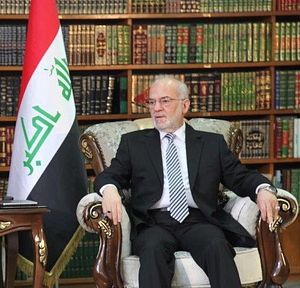Iraqi Foreign Minister Ibrahim al-Jaafari has been in China since June 13 for an official visit, including meetings with his Chinese counterpart, Wang Yi, and State Councilor Yang Jiechi.
On June 14, Iraq’s Ministry of Foreign Affairs described the purpose of his visit: “he will, during the visit to China, address the world to side with Iraq in its legitimate war against IS [Islamic State]” (all sic). Jaafari noted that China has “expressed its readiness to support Iraq in its war against the terrorist Islamic State (IS) gangs without joining the international coalition,” referencing a conversation he had with Wang in September 2014. At that time, Jaafari said that Wang had offered China’s help in defeating IS, including providing support for air strikes – although Wang made it clear that China’s existing policies would not allow it to join the U.S.-led international coalition against IS.
China has been coy about its commitment to the fight against IS, however, not willing to publicly commit to anything beyond personnel training for Iraqis. The official Chinese statement on the September meeting between Wang and Jaafari, for example, made no mention of increased Chinese commitment to fight IS. Instead, the statement noted Wang’s vague pledge that “as the friend of Iraq, China will continue to provide the Iraqi side with what it needs, including the emergency humanitarian assistance.” Despite repeated official pronouncements of concern over IS (including the possibility of Chinese fighters with the group coming back to China to conduct terrorist attacks), China has shown no inclination to provide military assistance to the Iraqi government.
Jaafari’s meetings in China came to a similar result. According to Xinhua, State Councilor Yang told Jaafari “that China backs Iraq on its efforts to safeguard national sovereignty, territorial integrity and promote domestic stability.” There was no mention, however, of what specifically China would do to provide this backing. Instead, Yang promised economic cooperation similar to what China has offered many other countries — “bilateral cooperation in energy, infrastructure and other sectors under the country’s ‘Belt and Road’ framework.”
Wang’s talk with Jaafari was similarly themed, according to China’s Ministry of Foreign Affairs. Wang told his Iraqi counterpart that China “welcomes and appreciates Iraq’s proactively participation in the construction of the ‘Belt and Road’ proposed by Xi Jinping.” Wang added that joint work on the “Belt and Road” would help China and Iraq “consolidate and deepen” their cooperation in “traditional areas” such as energy and infrastructure building, while also breaking new ground on joint cooperation to industrialize Iraq. Again, there was no mention of IS, aside from Wang’s assurance that China “resolutely supports Iraq’s efforts to defend its sovereignty, independence, territorial integrity, and national security stability.”
Given China’s unwillingness to be pinned down on security issues, Iraq may be resigned to interacting with Beijing mostly on the economic level. RT’s Eisa Ali describes meeting with Mowaffak al-Rubaie in Iraq and hearing the former Iraqi nation security advisor suggest that “Iraq must diversify its friends and tilt to the east, to Russia for military and intelligence cooperation and China for economic cooperation.”
Under Rubaie’s formula, the sort of economic cooperation offered to Jaafari is exactly what Iraq needs from China – and at the very least it’s probably all Jaafari realistically expected.
































